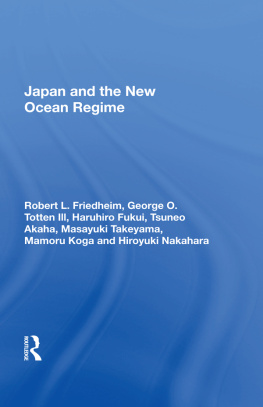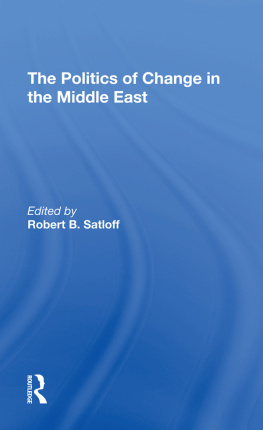Also of Interest
The Management of Pacific Marine Resources: Present Problems and Future Trends , John P. Craven
Managing Ocean Resources: A Primer , edited by Robert L. Friedheim
Making Ocean Policy: The Politics of Government Organization and Management , edited by Francis W. Hoole, Robert L. Friedheim, and Timothy M. Hennessey
Resource Management and the Oceans: The Political Economy of Deep Seabed Mining , Kurt Michael Schusterich
Georges Bank: Past, Present, and Future of a Marine Environment , edited by Guy C. McLeod and John H. Prescott
Japans Economy: Coping with Change in the International Environment , edited by Daniel I. Okimoto
Food from the Sea: The Economics and Politics of Ocean Fisheries , Frederick W. Bell
Waste Disposal in the Oceans: Minimizing Impact, Maximizing Benefits , edited by Dorothy Soule and Don Walsh
Japan: Profile of a Postindustrial Power , Ardath Burks
Japan: Economic Growth, Resource Scarcity, and Environmental Constraints , Edward A. Olsen
Note
Available in hardcover and paperback.
Westview Special Studies in Ocean Science and Policy
Japan and the New Ocean Regime
Robert L. Friedheim, George O. Totten III, Haruhiro Fukui, Tsuneo Akaha, Masayuki Takeyama, Mamoru Koga, Hiroyuki Nakahara
The regime under which humankind has governed its uses of the ocean is in the process of changeshifting away from the traditional freedom of the seas toward a mixed system in which most of the valuable near-shore resources come under coastal jurisdiction. The transition to a new regime has been difficult for many states, most notably Japan, whose rights to use the entire ocean were well protected by the traditional regime.
Japans response to the need to develop a modern ocean policy to adapt to the emerging ocean management regimeis the subject of this multiauthor volume. U.S. and Japanese scholars look at what Japan is doing, how, and with what results. They first assess general trends in ocean management, then examine the role of Japan in the international political economy of the oceans, and finally look at Japans ocean policy in various sectors: shipbuilding, fisheries, mineral resources, offshore petroleum, and nuclear power generation. Given Japans importance in ocean affairs, the authors point out that the lessons that can be learned from its experience are of prime international importance.
Robert L. Friedheim is associate director for marine policy at the Institute for Marine and Coastal Studies, University of Southern California, where George 0. Totten III is chairman of and professor in the Department of Political Science. Haruhiro Fukui is professor of political science at the University of California, Santa Barbara. Tsuneo Akaha is assistant professor of political science at Bowling Green University, Ohio. Masayuki Takeyama is assistant professor of law at Chuo University in Tokyo. Mamoru Koga is lecturer at Aichi University of the Arts in Nagoya. Hiroyuki Nakahara is senior researcher at the Institute of Ocean Economics, Tokyo.
Published under the auspices of the Institute for Marine and Coastal Studies University of Southern California Los Angeles, California
First published 1984 by Westview Press
Published 2018 by Routledge
52 Vanderbilt Avenue, New York, NY 10017
2 Park Square, Milton Park, Abingdon, Oxon OX14 4RN
Routledge is an imprint of the Taylor & Francis Group, an informa business
Copyright 1984 by Taylor & Francis
All rights reserved. No part of this book may be reprinted or reproduced or utilised in any form or by any electronic, mechanical, or other means, now known or hereafter invented, including photocopying and recording, or in any information storage or retrieval system, without permission in writing from the publishers.
Notice:
Product or corporate names may be trademarks or registered trademarks, and are used only for identification and explanation without intent to infringe.
Library of Congress Catalog Card Number: 83-51484
ISBN: 0-86531-687-2
ISBN 13: 978-0-367-01500-8 (hbk)
by
Robert L. Friedheim
The origins of this book lie in an earlier project. It was executed by me and some junior colleagues at the University of Southern California for the same program in the National Science Foundation that eventually supported the work found in this book. From the late 1960s to the early 1970s, the International Decade for Ocean Exploration Program, created in response to an initiative of the United Nations by President Lyndon Johnson sponsored large ocean exploration programs in a number of areas of basic ocean science. These were designed to provide the knowledge to use the oceans more wisely. But as data accumulated, it became clear that different states were in different stages of preparation in terms of their abilities to use the ocean. The gap between developed and developing was immediately obvious on the oceans as elsewhere. But there were also some important differences as well as similarities between the ocean problems and policy responses of developed states. Moreover, this was an era of vigorous ocean policy development and ferment. During this period, a number of states unilaterally extended their jurisdiction; offshore oil exploration and production moved further out to sea; there was intense political as well as economic competition over the fisheries of the world; the possibility of ocean minerals exploitation seemed to promise to come to fruition in the near future; there was a huge increase in the volume of world trade with a concomitant revolution in the technologies used for carriage, such as containerization for finished goods and the development of the VLCC (very large crude carrier) for bulks; the convening of the Third United Nations Law of the Sea conference; and the huge increase in national laws claiming jurisdiction over areas as well as functions, such as environmental management.
In the spring of 1982, the United Nations Law of the Sea conference finally completed its work and voted out a comprehensive treaty on ocean law that is likely to mold the ocean policies of most states of the world for decades to come. As all observers of the ocean policy scene know, the United States and a limited number of developed statesalbeit important states in ocean affairsrefused to sign and/or ratify the treaty. Nevertheless, with the exception of the contentious problem of the management of efforts to mine the seabed beyond national jurisdiction, most of the provisions of the treaty are widely accepted even by those states that repudiated the formal treaty. Indeed, it can be argued that most of the treaty merely ratified a trend already evident in world ocean politics, the trend toward the enclosure of ocean space. Since the end of World War IIto put an arbitrary date to it (as exemplified by the Truman Proclamations on the seabed and fisheries)it has been obvious that the coastal states of the world have been pushing their jurisdictional and sovereign borders outward.








